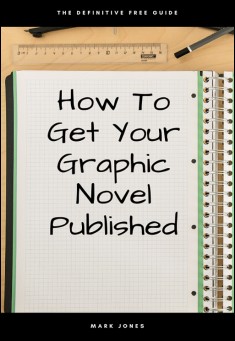Real experience comes from working within the publishing industry. In this easy to read guide, you'll discover the reasons publishers reject so many graphic novel scripts. Save yourself time and energy, and understand how the publishing game works.
Excerpt:
What do you want?
Fame, money, success, power, or satisfaction?
I’ve thought long and hard about that question during my career. I think that fame usually brings a lot of money, and certainly, success can bring both money and power. However, what about satisfaction?
I think if it is used in the right way, satisfaction brings all of the aforementioned and a colossal amount of money. If you look at the success stories of people such as Steve Jobs, Bill Gates and their ilk – they were never really in it for the money.
Those chosen few, the great creative talents of our time, all seem to be motivated by satisfaction. They want to be successful, and they certainly want a lot of money, but what defines them is their passion for what they do. Apply passion to any career, and you can expect success of some kind to come along.
How can you become successful at being a published author, particularly in a field where the money is often not that great?
You need to have a colossal amount of love for comics and graphic novels, but even that is not enough. You will need to devote yourself to the study of writing, grammar, and even marketing.
In the age of the Kindle and the tablet computer, the writer is now a one-man-band. He may write, possibly also illustrate, and even do his marketing. In the twenty-first century, writers are becoming the ultimate entrepreneurs.
In competitive times, one needs an advantage. What is it that you can do that no one else seems to have considered? Sure, you can write and perhaps designing a book cover is no big deal for you. What topic should you add to your list in your quest to break into comics and graphic novel publishing?
How about knowing what the publishers think about their writers? Not just the successful writers, but the newcomers knocking on the door and trying to sell their first script? In an ideal world, you would be able to know the culture and way of thinking in a publishing house.
Look in a dictionary, and you’ll find culture and way of thinking are described as one single word: mindset.
This book provides insight, for writers, as to the mindset of a publishing organisation. Within this book, I will enable the reader to understand the way that editors, artists, desktop publishers, and marketing people think.
As a published writer and editor, I want to share my experiences with you in the best way that I can. I also want to show you an area of publishing that does not seem to have been covered in other books.
I am often asked why publishing houses seem to be harder to break into than banks. Many writers will also ask me a variety of questions, the most popular of which seems to be: why will they not even read my material?
What some writers should be asking is what goes on inside the publishing house? What are office politics? What happens to an editor once he agrees to try and publish my material? How can I ensure my work is published on time and resembles the material I originally submitted?
To become truly successful in publishing, understanding the culture and the way that a publishing house operates is of prime importance. If you are constantly sending your writing out, but not even receiving a reply then what I have to offer will be of great help.
For those simply wanting to know more about graphic novel publishing, this book also intends to provide a short, but firm, grasp of the basics.
If this book succeeds: writers will understand the mindset of publishers, and will be forewarned of potential problems and how to avoid them.
Each chapter of the book examines a process of graphic novel production, there are also personal accounts of what can make some processes difficult to complete. I will not stick to a rigid format for every process, but list issues that prevent most writers from having successful careers.




